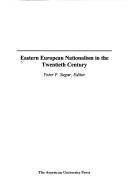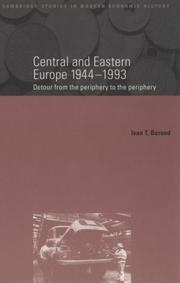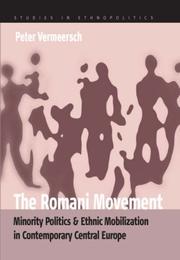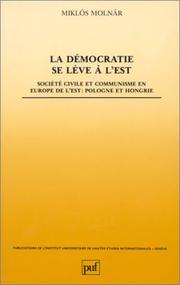| Listing 1 - 5 of 5 |
Sort by
|

ISBN: 1879383403 187938339X Year: 1995 Publisher: Lanham, Md. ; Washington ; London American University Press
Abstract | Keywords | Export | Availability | Bookmark
 Loading...
Loading...Choose an application
- Reference Manager
- EndNote
- RefWorks (Direct export to RefWorks)
Nationalism --- Europe, Eastern --- Politics and government --- Europe [Eastern ] --- 20th century --- Europe, Eastern - Politics and government - 20th century.

ISBN: 0521550661 0585039763 9780585039763 0511836961 9780511836961 1316174964 9781316174968 1316170632 9781316170632 0521663520 9780521663526 1316176177 9781316176177 1316173860 9781316173862 0511965338 9780511965333 0511581742 9780511581748 0511000596 9780511000591 9780521550666 1322177597 Year: 1996 Volume: 1 Publisher: Cambridge Cambridge University Press
Abstract | Keywords | Export | Availability | Bookmark
 Loading...
Loading...Choose an application
- Reference Manager
- EndNote
- RefWorks (Direct export to RefWorks)
In this wide-ranging account, Ivan Berend traces the post-war fortunes of the countries lying between Germany and the former Soviet Union. Professor Berend draws both on his academic expertise and personal involvement in many of the events which he describes to produce a synthesis of a huge array of materials. His study stretches beyond the confines of economic history to provide insights into the complex interplay of ideological, social and political forces in the 'Eastern Bloc' countries over the last fifty years of revolutionary change. In particular Berend's analysis of totalitarianism, the development of nationalism, and the personalities at the centre of political life in eastern Europe offers an alternative perspective on the economies of the state-socialist regimes at the periphery of the western industrialised world.
History of Eastern Europe --- anno 1900-1999 --- Communism --- History --- Europe, Eastern --- Politics and government --- History. --- Communisme --- Histoire --- Europe de l'Est --- Politique et gouvernement --- Europe [Eastern ] --- 20th century --- Europe, Eastern - History - 20th century. --- Europe, Eastern - Politics and government - 20th century. --- Arts and Humanities --- Communism - Europe, Eastern - History --- Europe, Eastern - History - 20th Century --- Europe, Eastern - Politics and government - 20th century

ISBN: 0857456784 1845451023 Year: 2007 Publisher: New York, NY : Berghahn Books,
Abstract | Keywords | Export | Availability | Bookmark
 Loading...
Loading...Choose an application
- Reference Manager
- EndNote
- RefWorks (Direct export to RefWorks)
The collapse of communism and the process of state building that ensued in the 1990s have highlighted the existence of significant minorities in many European states, particularly in Central Europe. In this context, the growing plight of Europe's biggest minority, the Roma (Gypsies), has been particularly salient. Traditionally dispersed, possessing few resources and devoid of a common "kin state" to protect their interests, the Roma have often suffered from widespread exclusion and institutionalized discrimination. Politically underrepresented and lacking popular support amongst the wider
Romanies -- Europe, Eastern -- Government relations -- 20th century. --- Romanies -- Europe, Eastern -- Government relations -- 21st century. --- Romanies -- Europe, Eastern -- Politics and government -- 20th century. --- Romanies -- Europe, Eastern -- Politics and government -- 21st century. --- 1900-2099 --- Eastern Europe. --- Mitteleuropa

ISBN: 2130431941 2940549338 9782130431947 Year: 1990 Publisher: Graduate Institute Publications
Abstract | Keywords | Export | Availability | Bookmark
 Loading...
Loading...Choose an application
- Reference Manager
- EndNote
- RefWorks (Direct export to RefWorks)
L'histoire au présent, un livre qui analyse l'Europe communiste jusqu'à la fin 1989. La réalité dépasse toutes les prévisions : l’Europe communiste est en pleine décomposition et des démocraties émergent après quarante ans de régime totalitaire. Le communisme s’interroge sur son passé et l’Europe sur son avenir. Devant ces énormes bouleversements, le livre de Miklós Molnár – professeur émérite de l’Institut Universitaire de Hautes Études Internationales, auteur de nombreux ouvrages sur le phénomène communiste en Europe centrale – nous apporte une première réponse approfondie. À ce moment, la perestroïka – encore incertaine en URSS – se réalise dans plusieurs satellites de Moscou. Par le biais de la Pologne et de la Hongrie, l’auteur examine ce long processus d’évolution, semé d’embûches et d’échecs, qui a conduit à la désintégration de leur système communiste. Simultanément, on constate une difficile mutation économique. L’analyse de ces changements est menée jusqu’à la fin de 1989. En outre, l’auteur remonte aux origines historiques et culturelles de la crise du communisme. Il confronte les fondements idéologiques du système aux racines culturelles des pays en question et montre les conséquences sociologiques entraînées par la stalinisation. L’ouvrage consacre une place importante à la société civile qui a trouvé refuge dans les valeurs spirituelles, et qui, loin d’avoir été stérilisée, a provoqué ce mouvement de liberté et de renouveau. Elle permet aujourd’hui à la démocratie de renaître dans les pays les plus avancés de l’Europe de l’Est.
Communism and society --- Democracy --- Communisme et société --- Démocratie --- Europe, Eastern --- Hungary --- Poland --- Pologne --- Autonomy and independence movements --- Communism --- Autonomy and independence movements. --- Communism. --- Communisme --- 321.74 <4-11> --- Politics and government --- Social conditions. --- Social conditions --- Communism - Europe, Eastern --- Europe, Eastern - Politics and government - 20th century --- Europe, Eastern - Social conditions --- Etat | nation --- démocratie --- nationalisme --- géopolitique --- EUROPE CENTRALE --- POLOGNE --- HISTOIRE --- HONGRIE --- HISTOIRE CONSTITUTIONNELLE --- 20E SIECLE
Book
ISBN: 2724610059 9782724610055 Year: 2006 Publisher: Paris Presses de sciences po
Abstract | Keywords | Export | Availability | Bookmark
 Loading...
Loading...Choose an application
- Reference Manager
- EndNote
- RefWorks (Direct export to RefWorks)
Bibliotheek François Vercammen
Post-communism --- Social change --- Postcommunisme --- Changement social --- Europe, Eastern --- Europe, Central --- Europe de l'Est --- Europe centrale --- Economic conditions --- Politics and government --- Social conditions --- Conditions économiques --- Politique et gouvernement --- Conditions sociales --- Economic policy --- BPB0701 --- 308 <4> --- Sociografie. Sociaal economische geografie. Sociale toestand--Europa --- 308 <4> Sociografie. Sociaal economische geografie. Sociale toestand--Europa --- Conditions économiques --- Post-communism - Europe, Eastern --- Social change - Europe, Eastern --- Europe, Central - Politics and government - 20th century --- Europe, Eastern - Politics and government - 20th century --- Europe, Central - Social conditions --- Europe, Eastern - Social conditions --- Europe, Eastern - Economic policy - 1989 --- -Europe, Eastern - Politics and government - 1989 --- -Post-communism --- -Post-communism - Europe, Eastern
| Listing 1 - 5 of 5 |
Sort by
|

 Search
Search Feedback
Feedback About UniCat
About UniCat  Help
Help News
News